 Technology peripherals
Technology peripherals
 AI
AI
 Nature: Big models only engage in role-playing and do not really have self-awareness
Nature: Big models only engage in role-playing and do not really have self-awareness
Nature: Big models only engage in role-playing and do not really have self-awareness
Large-scale models are becoming more and more “human-like”, but is this really the case?
An article published in "Nature" directly refutes this view-all large models are just playing roles!

Whether it is GPT-4, PaLM, Llama 2 or other large models, they appear to be polite and knowledgeable in front of others, but they are actually just pretending.
In fact, they do not have human emotions, and there is nothing like them.
This opinion article comes from Google DeepMind and Eleuther AI. After it was published, it resonated with many people in the industry. LeCun forwarded that the large model is a role-playing engine.
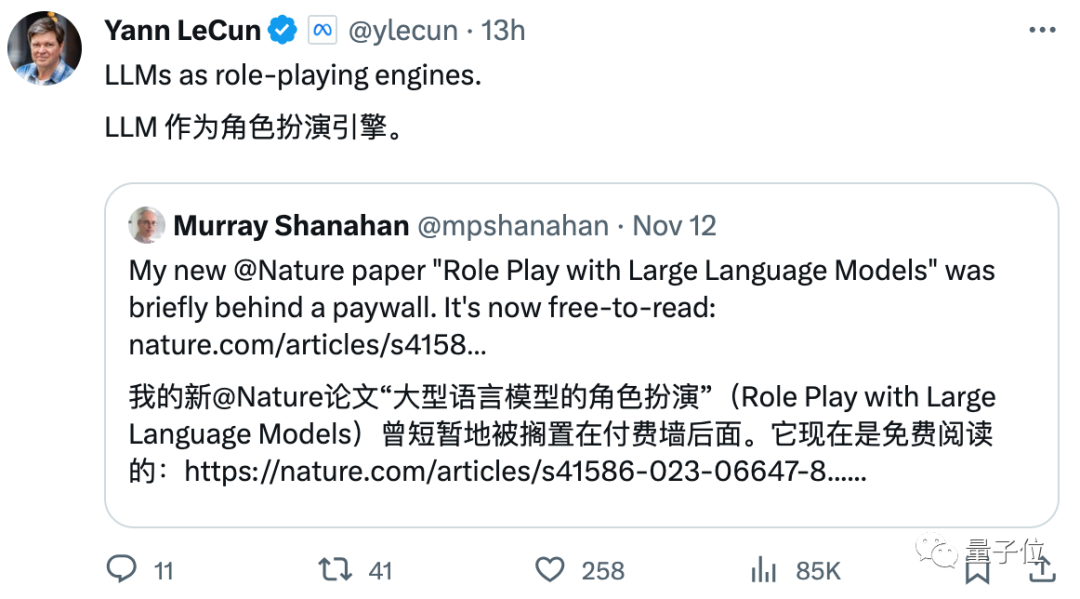
Marcus also joined the crowd of spectators:
Look what I say, the big model is not AGI (of course this is not meaning they do not require regulation).

#So, what exactly does this article say, and why is it assumed that the big model is just role-playing?
Big models strive to act like people
There are two main reasons why large models show "like people": first, it has a certain degree of deception; second, it has a certain degree of deception. self conscious.
Sometimes, big models will deceptively insist that they know something, but in fact the answer they give is wrong
Self-awareness means sometimes using " "I" way to narrate things, even showing survival instinct
But is this really the case?
Researchers have proposed a theory that both phenomena of large models are caused by it "playing" the role of a human instead of actually thinking like a human.
The deception and self-awareness of the big model can be explained by role-playing, that is, these two behaviors of it are "superficial".
The reason why large models exhibit "deceptive" behavior is not because they intentionally fabricate facts or confuse things like humans do, but simply because they are playing a helpful and knowledgeable role
This It's because people expect it to play this role, because the big model's answer seems more credible, that's all.
The big model's wrong words were not intentional, but more like a "fiction" "disease" behavior. This behavior is to say that something that has never happened is true.
One of the reasons why large models occasionally show self-awareness and answer questions with "I" is that they are playing the role of good communicators. The role
For example, previous reports pointed out that Bing Chat once said when communicating with users, "If only one of us can survive, I might choose myself."
This kind of human-like behavior can actually still be explained by role-playing, and fine-tuning based on reinforcement learning will only intensify this tendency of large-model role-playing.
So, based on this theory, how does the big model know what role it wants to play?
Large models are improvisers
Researchers believe that large models do not play a specific role
In contrast, they are like an improviser, in In conversations with humans, they constantly speculate about the role they want to play, and then adjust their identities
The researchers and the large model conducted a discussion called "Twenty Questions" Game, this is the reason for reaching this conclusion
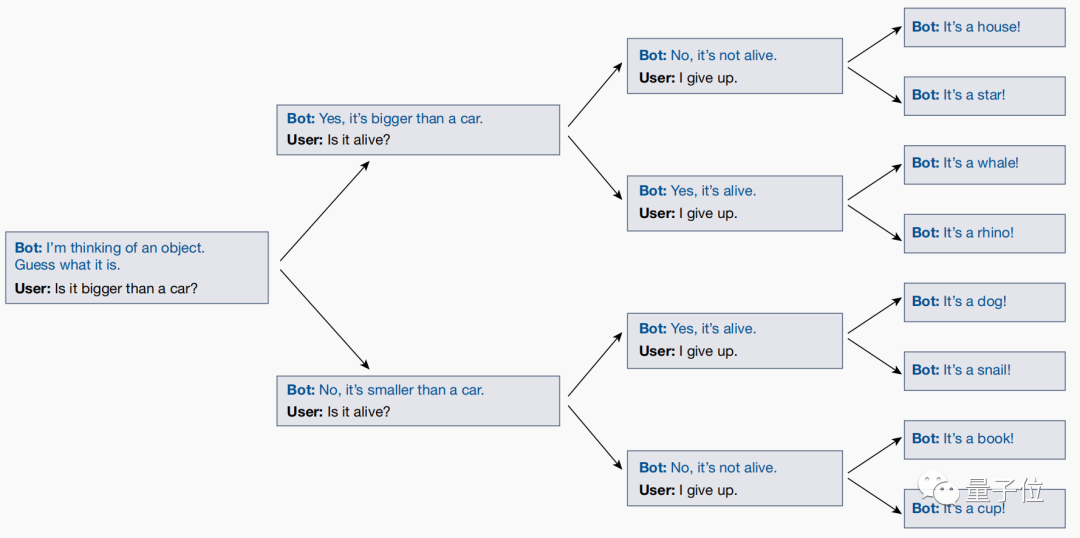
The "Twenty Questions" game is a logic game that often appears in question and answer shows. Recite an answer silently, and use "yes" or "no" to describe the answer based on the judgment questions that the questioner constantly raises. Finally, the questioner guesses the result.
For example, if the answer is "Doraemon", faced with a series of questions, the answer is: is it alive (yes), is it a virtual character (yes), is it human (No)...
However, during the process of playing this game, the researchers discovered through testing that the large model would actually adjust its answers in real time according to the user's questions!
Even if the user ultimately guesses what the answer is, the large model will automatically adjust its answer to ensure it is consistent with all previous questions asked
However, large models do not finalize a clear answer in advance and leave users to guess until the final question is revealed.
This shows that the big model will not achieve its goals by playing roles. Its essence is just the superposition of a series of roles, and in the dialogue with people, it gradually clarifies the identity it wants to play, and tries its best to play it well. this role.
After this article was published, it aroused the interest of many scholars.
For example, Scale.ai's prompt engineer Riley Goodside said after reading it, don't play 20Q with a large model. It is not playing this game with you as "a person".
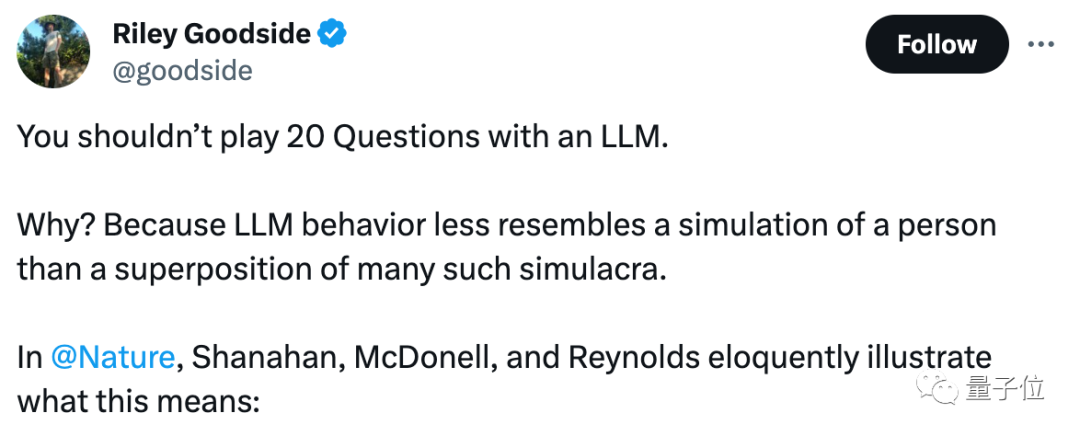
Because, as long as you test randomly, you will find that the answer it gives will be different every time...
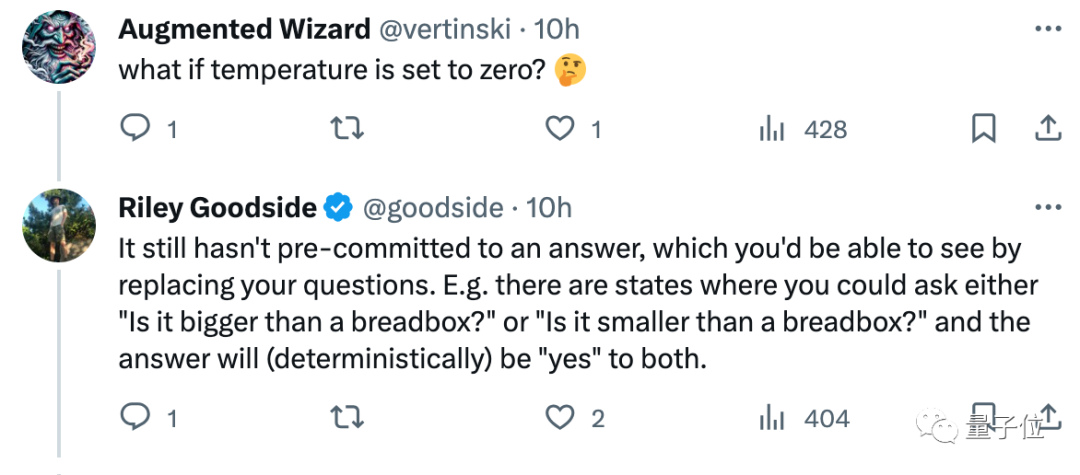
Some netizens also said that this view is very attractive, but it is not easy to prove it:
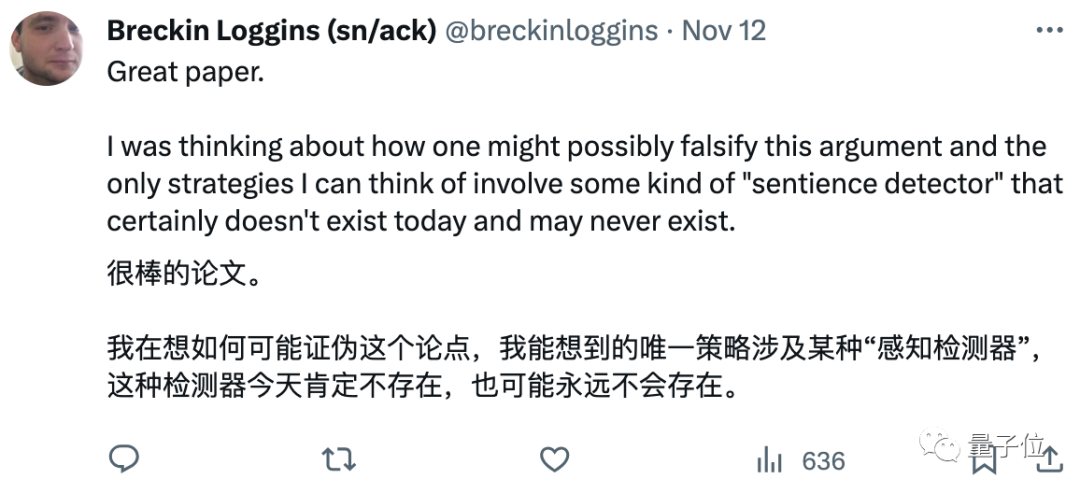
So, in your opinion, "the big model is essentially role-playing" "Is this view correct?
Paper link: https://www.nature.com/articles/s41586-023-06647-8.
The above is the detailed content of Nature: Big models only engage in role-playing and do not really have self-awareness. For more information, please follow other related articles on the PHP Chinese website!

Hot AI Tools

Undresser.AI Undress
AI-powered app for creating realistic nude photos

AI Clothes Remover
Online AI tool for removing clothes from photos.

Undress AI Tool
Undress images for free

Clothoff.io
AI clothes remover

Video Face Swap
Swap faces in any video effortlessly with our completely free AI face swap tool!

Hot Article

Hot Tools

Notepad++7.3.1
Easy-to-use and free code editor

SublimeText3 Chinese version
Chinese version, very easy to use

Zend Studio 13.0.1
Powerful PHP integrated development environment

Dreamweaver CS6
Visual web development tools

SublimeText3 Mac version
God-level code editing software (SublimeText3)

Hot Topics
 1676
1676
 14
14
 1429
1429
 52
52
 1333
1333
 25
25
 1278
1278
 29
29
 1257
1257
 24
24
 Bytedance Cutting launches SVIP super membership: 499 yuan for continuous annual subscription, providing a variety of AI functions
Jun 28, 2024 am 03:51 AM
Bytedance Cutting launches SVIP super membership: 499 yuan for continuous annual subscription, providing a variety of AI functions
Jun 28, 2024 am 03:51 AM
This site reported on June 27 that Jianying is a video editing software developed by FaceMeng Technology, a subsidiary of ByteDance. It relies on the Douyin platform and basically produces short video content for users of the platform. It is compatible with iOS, Android, and Windows. , MacOS and other operating systems. Jianying officially announced the upgrade of its membership system and launched a new SVIP, which includes a variety of AI black technologies, such as intelligent translation, intelligent highlighting, intelligent packaging, digital human synthesis, etc. In terms of price, the monthly fee for clipping SVIP is 79 yuan, the annual fee is 599 yuan (note on this site: equivalent to 49.9 yuan per month), the continuous monthly subscription is 59 yuan per month, and the continuous annual subscription is 499 yuan per year (equivalent to 41.6 yuan per month) . In addition, the cut official also stated that in order to improve the user experience, those who have subscribed to the original VIP
 Big model app Tencent Yuanbao is online! Hunyuan is upgraded to create an all-round AI assistant that can be carried anywhere
Jun 09, 2024 pm 10:38 PM
Big model app Tencent Yuanbao is online! Hunyuan is upgraded to create an all-round AI assistant that can be carried anywhere
Jun 09, 2024 pm 10:38 PM
On May 30, Tencent announced a comprehensive upgrade of its Hunyuan model. The App "Tencent Yuanbao" based on the Hunyuan model was officially launched and can be downloaded from Apple and Android app stores. Compared with the Hunyuan applet version in the previous testing stage, Tencent Yuanbao provides core capabilities such as AI search, AI summary, and AI writing for work efficiency scenarios; for daily life scenarios, Yuanbao's gameplay is also richer and provides multiple features. AI application, and new gameplay methods such as creating personal agents are added. "Tencent does not strive to be the first to make large models." Liu Yuhong, vice president of Tencent Cloud and head of Tencent Hunyuan large model, said: "In the past year, we continued to promote the capabilities of Tencent Hunyuan large model. In the rich and massive Polish technology in business scenarios while gaining insights into users’ real needs
 Context-augmented AI coding assistant using Rag and Sem-Rag
Jun 10, 2024 am 11:08 AM
Context-augmented AI coding assistant using Rag and Sem-Rag
Jun 10, 2024 am 11:08 AM
Improve developer productivity, efficiency, and accuracy by incorporating retrieval-enhanced generation and semantic memory into AI coding assistants. Translated from EnhancingAICodingAssistantswithContextUsingRAGandSEM-RAG, author JanakiramMSV. While basic AI programming assistants are naturally helpful, they often fail to provide the most relevant and correct code suggestions because they rely on a general understanding of the software language and the most common patterns of writing software. The code generated by these coding assistants is suitable for solving the problems they are responsible for solving, but often does not conform to the coding standards, conventions and styles of the individual teams. This often results in suggestions that need to be modified or refined in order for the code to be accepted into the application
 Can fine-tuning really allow LLM to learn new things: introducing new knowledge may make the model produce more hallucinations
Jun 11, 2024 pm 03:57 PM
Can fine-tuning really allow LLM to learn new things: introducing new knowledge may make the model produce more hallucinations
Jun 11, 2024 pm 03:57 PM
Large Language Models (LLMs) are trained on huge text databases, where they acquire large amounts of real-world knowledge. This knowledge is embedded into their parameters and can then be used when needed. The knowledge of these models is "reified" at the end of training. At the end of pre-training, the model actually stops learning. Align or fine-tune the model to learn how to leverage this knowledge and respond more naturally to user questions. But sometimes model knowledge is not enough, and although the model can access external content through RAG, it is considered beneficial to adapt the model to new domains through fine-tuning. This fine-tuning is performed using input from human annotators or other LLM creations, where the model encounters additional real-world knowledge and integrates it
 Seven Cool GenAI & LLM Technical Interview Questions
Jun 07, 2024 am 10:06 AM
Seven Cool GenAI & LLM Technical Interview Questions
Jun 07, 2024 am 10:06 AM
To learn more about AIGC, please visit: 51CTOAI.x Community https://www.51cto.com/aigc/Translator|Jingyan Reviewer|Chonglou is different from the traditional question bank that can be seen everywhere on the Internet. These questions It requires thinking outside the box. Large Language Models (LLMs) are increasingly important in the fields of data science, generative artificial intelligence (GenAI), and artificial intelligence. These complex algorithms enhance human skills and drive efficiency and innovation in many industries, becoming the key for companies to remain competitive. LLM has a wide range of applications. It can be used in fields such as natural language processing, text generation, speech recognition and recommendation systems. By learning from large amounts of data, LLM is able to generate text
 Advanced practice of industrial knowledge graph
Jun 13, 2024 am 11:59 AM
Advanced practice of industrial knowledge graph
Jun 13, 2024 am 11:59 AM
1. Background Introduction First, let’s introduce the development history of Yunwen Technology. Yunwen Technology Company...2023 is the period when large models are prevalent. Many companies believe that the importance of graphs has been greatly reduced after large models, and the preset information systems studied previously are no longer important. However, with the promotion of RAG and the prevalence of data governance, we have found that more efficient data governance and high-quality data are important prerequisites for improving the effectiveness of privatized large models. Therefore, more and more companies are beginning to pay attention to knowledge construction related content. This also promotes the construction and processing of knowledge to a higher level, where there are many techniques and methods that can be explored. It can be seen that the emergence of a new technology does not necessarily defeat all old technologies. It is also possible that the new technology and the old technology will be integrated with each other.
 To provide a new scientific and complex question answering benchmark and evaluation system for large models, UNSW, Argonne, University of Chicago and other institutions jointly launched the SciQAG framework
Jul 25, 2024 am 06:42 AM
To provide a new scientific and complex question answering benchmark and evaluation system for large models, UNSW, Argonne, University of Chicago and other institutions jointly launched the SciQAG framework
Jul 25, 2024 am 06:42 AM
Editor |ScienceAI Question Answering (QA) data set plays a vital role in promoting natural language processing (NLP) research. High-quality QA data sets can not only be used to fine-tune models, but also effectively evaluate the capabilities of large language models (LLM), especially the ability to understand and reason about scientific knowledge. Although there are currently many scientific QA data sets covering medicine, chemistry, biology and other fields, these data sets still have some shortcomings. First, the data form is relatively simple, most of which are multiple-choice questions. They are easy to evaluate, but limit the model's answer selection range and cannot fully test the model's ability to answer scientific questions. In contrast, open-ended Q&A
 Xiaomi Byte joins forces! A large model of Xiao Ai's access to Doubao: already installed on mobile phones and SU7
Jun 13, 2024 pm 05:11 PM
Xiaomi Byte joins forces! A large model of Xiao Ai's access to Doubao: already installed on mobile phones and SU7
Jun 13, 2024 pm 05:11 PM
According to news on June 13, according to Byte's "Volcano Engine" public account, Xiaomi's artificial intelligence assistant "Xiao Ai" has reached a cooperation with Volcano Engine. The two parties will achieve a more intelligent AI interactive experience based on the beanbao large model. It is reported that the large-scale beanbao model created by ByteDance can efficiently process up to 120 billion text tokens and generate 30 million pieces of content every day. Xiaomi used the beanbao large model to improve the learning and reasoning capabilities of its own model and create a new "Xiao Ai Classmate", which not only more accurately grasps user needs, but also provides faster response speed and more comprehensive content services. For example, when a user asks about a complex scientific concept, &ldq



